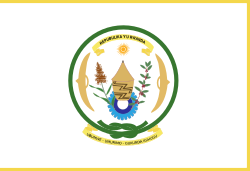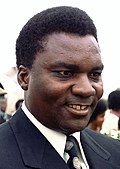| President of the Republic of Rwanda | |
|---|---|
| Perezida wa Repubulika y’u Rwanda (Kinyarwanda) Rais wa Jamhuri ya Rwanda (Swahili) Président de la République du Rwanda (French) | |
 Presidential Standard | |
| Style | Mr President (informal) His Excellency (diplomatic) |
| Type | Head of state Executive president |
| Residence | Village Urugwiro |
| Seat | Kigali |
| Appointer | Popular vote |
| Term length | Five years, renewable |
| Constituting instrument | Constitution of Rwanda (2003) |
| Formation | 28 January 1961 |
| First holder | Dominique Mbonyumutwa |
| Salary | US$85,000 annually [1] |
| Website | Official Website |
 |
|---|
This article lists the presidents of Rwanda since the creation of the office in 1961 (during the Rwandan Revolution), to the present day.
Contents
The president of Rwanda is the head of state and head of executive [2] of the Republic of Rwanda. The president is elected every seven years by popular vote, [3] and appoints the prime minister and all other members of Cabinet. [4]
A total of four people have served in the office. The incumbent president is Paul Kagame, who took office on 22 April 2000, after being acting president for nearly a month.





